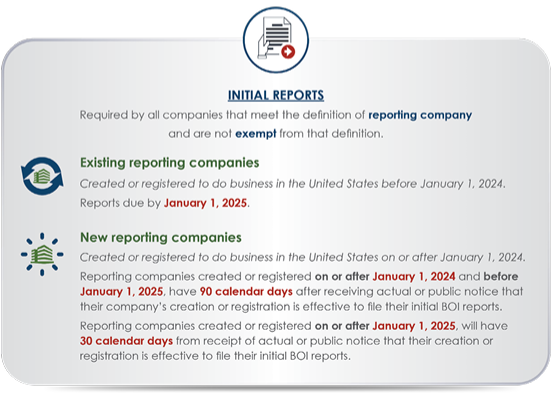October 15, 2024
BOI Reporting Under the Corporate Transparency Act
Understand BOI reporting under the Corporate Transparency Act. Stay compliant & avoid heavy penalties by protecting your small business with the right filings.
The Corporate Transparency Act (CTA) sounds like another bit of legal jargon, but its Beneficial Ownership Information (BOI) reporting mandate has started to feel like a sword hanging over many business owners.
However, a healthy perspective is in seeing compliances as journeys rather than destinations. This gives us a more productive way of dealing with what can seem like unnecessary bureaucratic demands.
We’re going to help you understand what this report is and how you can successfully deal with it as a business owner, and avoid the hefty penalties for non-compliance and missed deadlines.
Let’s break it down a bit first.
What Is the Corporate Transparency Act?
Passed in 2021, the Corporate Transparency Act was created to bring more transparency to corporate ownership in the U.S. Its main goal is to prevent criminals from using anonymous companies to launder money or finance illegal activities.
The CTA mandates that businesses file a Beneficial Ownership Information (BOI) report with FinCEN (the Financial Crimes Enforcement Network). This report lists the beneficial owners as people who not just own equity in a company, but have significant control or positional authority in the company. The idea is to create a standardized federal-level system, ensuring the government knows who is behind each business entity operating in the U.S.
If you own an LLC, corporation, or similar business entity, chances are this law affects you, and staying compliant with this is not optional. It’s a requirement, if you want to avoid severe financial and legal penalties.
Who Needs to File a BOI Report, and Who Doesn’t?
Not all businesses are required to file under the CTA. However, most small and medium-sized businesses will. You’ll need to file if
- your company is organized as an LLC, corporation, or S corporation created in a U.S. state, does less than $5 million a year in revenue and doesn’t have 20 or more full-time employees.
- another formal entity like a foreign business registered with a U.S. state or Native American tribe.
Exemptions exist for businesses already under heavy regulation, like banking, insurance and public utilities, and large operating companies generating over $5M and with 20 or more employees. Sole proprietorships and general partnerships are also exempt. The remainder of the exemptions cover non-profits, publicly traded companies, and companies registered under the Commodities Exchange Act.
You can check on the FinCEN site if your entity is liable to file the BOI report or exempt..
What Happens If You Don’t File?
Failing to file the BOI report can result in steep fines, which start at $591 (increased from $500 for inflation) per day that your business is out of compliance. For those who think they can dodge the system, criminal penalties, including potential jail time, are also on the table!
Deadlines are strict so it’s best to avoid being confused by going to the FinCEN site and noting them. You can download the PDF available on the site for your own reference.

If you’re unsure whether you need to file or what information is required, it’s crucial to consult with legal professionals. There are complexities in what needs to be reported, and the government isn’t lenient with mistakes.
How to Stay in Compliance (Easier with a Partner)
Given how close the deadlines are, a Wolters Kluwer survey showed that about one-third of small businesses subject to the BOI reporting mistakenly believed they didn’t need to file, creating the very real danger of millions of businesses running afoul of FinCEN’s rules.
Staying compliant with the CTA isn’t just about filing your BOI report once and forgetting about it. If any of the information in your report changes, such as a change in a beneficial owner’s address, or even an out of date driver’s license, you’ll need to file an update within 30 days. Most people are not going to be thinking that their expired driver’s license is going to impact their BOI report!
The best advice we can give is to encourage you to preempt being caught by surprise by consulting early and preparing well. To facilitate this, we are helping our clients by simplifying the process on our website.
You can check if you need to file by filling out a simple questionnaire. We then connect you to our partners CTA Integrity, who will handle the legwork, making sure all information is accurate and submitted on time, protecting your compliance, peace of mind, and the money in your pocket earned through penalties saved!
Conclusion
The Corporate Transparency Act is mandatory for now, and for small business owners, staying compliant is a must. While the process may seem like a hassle, it’s far better than facing financial penalties or, worse, criminal charges. Working with a specialized service provider can save time and reduce the stress of handling BOI reporting yourself.
So, if you’re running a business, make sure you understand your filing obligations and stay compliant. The costs of ignoring the CTA are too high to risk.
.svg)